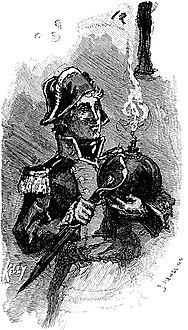St. Nicholas/Volume 32/Number 5/Salamander
A Salamander
By Frank E. Channon.
 t was a warm corner. Day after day the French soldiers had pushed their batteries nearer and nearer toward the besieged town, and now one could look out from behind the breastworks and plainly see the faces of the Austrian artillery-men, as they stuck to their guns with prim determination and sent their shots flying into the French forts.
t was a warm corner. Day after day the French soldiers had pushed their batteries nearer and nearer toward the besieged town, and now one could look out from behind the breastworks and plainly see the faces of the Austrian artillery-men, as they stuck to their guns with prim determination and sent their shots flying into the French forts.In one of these little mud-constructed forts, a small party of French soldiers, under the command of a corporal, were busily engaged in returning the fire of the enemy.
The corporal, a tall, gaunt young fellow of twenty, was directing the work of his men. Often he leaped to the ramparts to note what effect the fire of his guns was producing.
“Truly,” said one of the soldiers, as the corporal jumped back among them, thou art a veritable salamander, for thou canst stand fire.”
“Who is a salamander?” inquired a gruff voice from the rear of the smoke-filled battery.
“The soldiers turned and saw standing there a small, pale-faced man, in a general’s uniform.
One of the men pointed toward the corporal,
“It is he, general,” he replied.
“A salamander! We will see!” reiterated the officer, as he ran his eye over the corporal, “Can you write?” he inquired.
“Yes, my general.”
“Follow me, then.” Out into the shot-swept open the two passed, walking side by side.
“You seem,” remarked the general, pleasantly, “to be at least a foot taller than I. Kindly walk on this side,” and he indicated the side nearest to the enemy, “It will be a great protection to me.”
Without a word the corporal took the place.
Just at that moment a shell burst directly over their heads, but did them no harm.
The officer cast a quick glance at his companion. He was not in the least flurried. He did not even quicken his pace.
Presently they reached and entered a battery which was the nearest of all to the Austrian lines, It was filled with dead and wounded soldiers. Only one gun remained standing.
Calmly seating himself on a broken gun-carriage, the general gave the corporal paper and quill and ink, and commanded him to write as he began to dictate a letter.
The corporal’s hand did not shake. He wrote almost as rapidly as the general spoke.
Suddenly, just as the letter was finished, there was a deafening report, and a huge cannon-ball passed close above them and buried itself with a dull thud in the earth beyond. The wind caused by its passage overturned the two, and dust and dirt completely covered them.
The general picked himself up in an instant. Calmly leaping upon the ramparts, the corporal waved the finished letter defiantly toward the Austrian lines.
“Thanks, my friends,” he shouted. “You have saved me the trouble of blotting it.”
A look of genuine admiration crept into the eyes of the general.
“What is your name?” he asked harshly.
“Corporal Junot of the Ninth Foot, general.”
“Say rather ‘Captain Junot,’ for I cannot afford to let such fellows as you remain corporals”; and General Bonaparte—for it was he—clapped the young man on the shoulder.
Eight years later Marshal Junot was decorated with the grand cross of the Legion of Honor by the Emperor Napoleon.